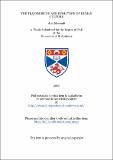Files in this item
The transmission and evolution of human culture
Item metadata
| dc.contributor.advisor | Whiten, Andrew | |
| dc.contributor.advisor | Laland, Kevin N. | |
| dc.contributor.author | Mesoudi, Alex | |
| dc.coverage.spatial | xiii, 394 p. | en_US |
| dc.date.accessioned | 2018-06-12T13:15:57Z | |
| dc.date.available | 2018-06-12T13:15:57Z | |
| dc.date.issued | 2005 | |
| dc.identifier.uri | https://hdl.handle.net/10023/13955 | |
| dc.description.abstract | 'Culture' is defined as information, such as knowledge, beliefs, skills, attitudes or values, that is passed from individual to individual via social (or cultural) transmission and expressed in behaviour or artifacts. 'Cultural evolution' holds that this cultural inheritance system is governed by the same Darwinian processes as gene-based biological evolution. In Part A of this thesis it is argued that as compelling a case can now be made for a Darwinian theory of cultural evolution as Darwin himself presented in The Origin Of Species for biological evolution, If culture does indeed evolve, then it follows that the structure of a science of cultural evolution should broadly resemble that of the science of biological evolution. Hence Part A concludes by outlining a unified science of cultural evolution based on the sub-disciplines of evolutionary biology. Parts B and C comprise original empirical and theoretical work constituting two branches of this science of cultural evolution. Part B describes a series of experiments testing for a number of hypothesised biases in cultural transmission. Evidence was found for a 'social bias' that acts to promote information concerning third-party social relationships over equivalent non-social information, and a 'hierarchical bias' that acts to transform knowledge of everyday events from low-level actions into higher-level goals. Three other hypothesised biases concerning status, anthropomorphism and neoteny were not supported, although each gave rise to potential, future work using this methodology. Part C presents a theoretical investigation into the coevolution of the genetic bases of human mating behaviour and culturally inherited folk beliefs regarding paternity. Gene-culture coevolution and agent-based models suggested that beliefs in 'partible paternity' (that more than one man can father a child) create a new more polygamous form of society compared with beliefs in singular paternity (that only one man can father a child). | en_US |
| dc.language.iso | en | en_US |
| dc.publisher | University of St Andrews | |
| dc.subject.lcc | GN360.M4 | |
| dc.subject.lcsh | Social evolution | en |
| dc.subject.lcsh | Social Darwinism | en |
| dc.subject.lcsh | Evolution (Biology) | en |
| dc.subject.lcsh | Culture | en |
| dc.title | The transmission and evolution of human culture | en_US |
| dc.type | Thesis | en_US |
| dc.type.qualificationlevel | Doctoral | en_US |
| dc.type.qualificationname | PhD Doctor of Philosophy | en_US |
| dc.publisher.institution | The University of St Andrews | en_US |
This item appears in the following Collection(s)
Items in the St Andrews Research Repository are protected by copyright, with all rights reserved, unless otherwise indicated.

